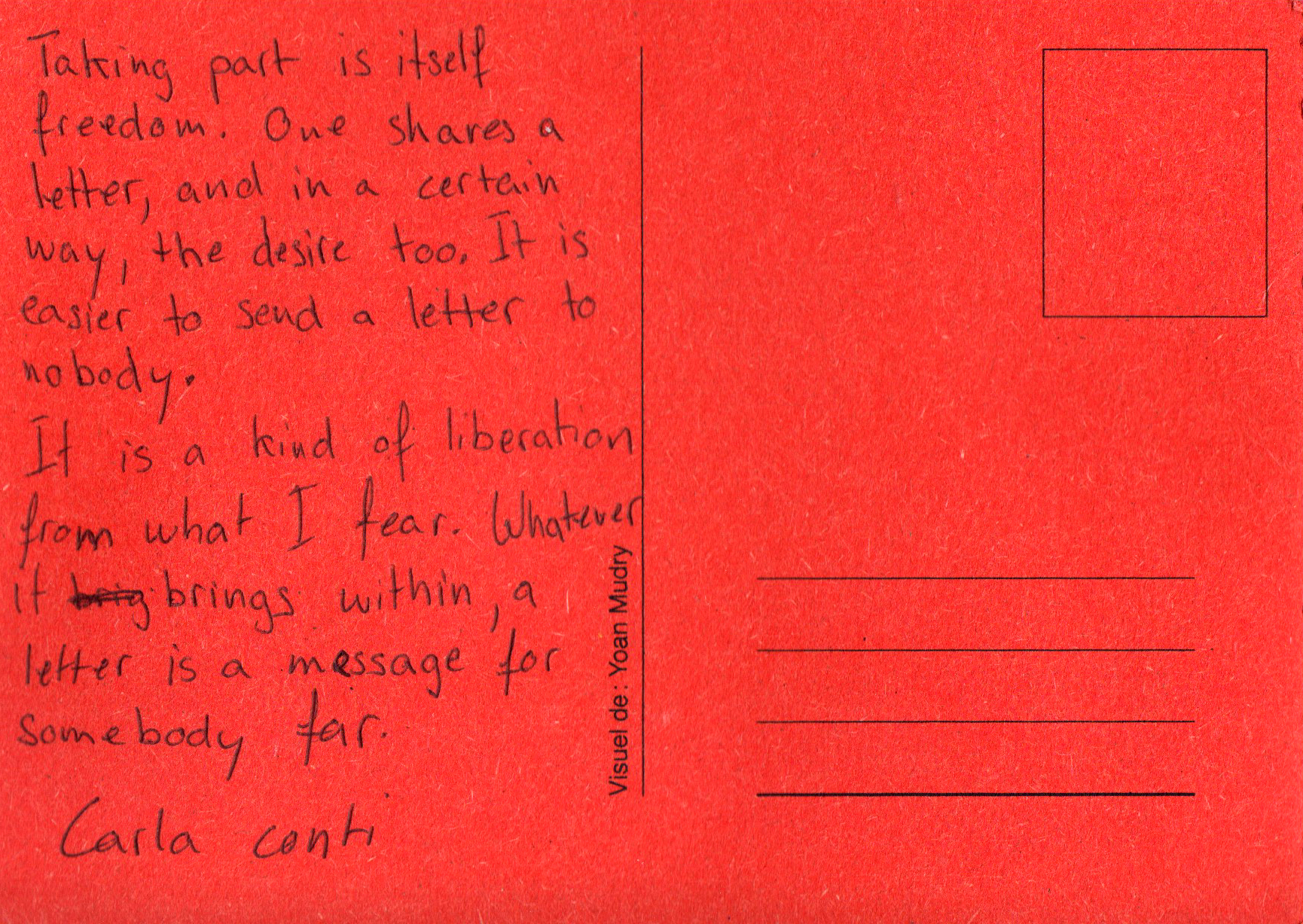Love Letters
H13:00-21:00
Booking required
‘I venerdì pomeriggio’ series
Entrance: via Ludovisi 48
H13:00-21:00
Booking required
‘I venerdì pomeriggio’ series
Entrance: via Ludovisi 48
Participation:
Different time slots are available for the physical participation in order to avoid gatherings.
Click here to book your time slot (feel free to join whenever within the two hours slot)
Istituto Svizzero
Via Ludovisi 48, Rome
You can also participate from afar! If you can’t join phisically, you can still be part of this experiment by sending us one (or twenty) letter(s) via e-mail.
The letters will be transcribed by hand during the event and sent with all the others.
I venerdì pomeriggio
I venerdì pomeriggio at Istituto Svizzero are dedicated to our residents. It is an opportunity for the public to learn more about the projects they are working on during this year’s residency.
The event is curated by Roxane Bovet & Yoan Mudry (Fellows Roma Calling 2020/2021) and Louis Schild (Fellow Palermo Calling 2020).
Love Letters
Love letters is inspired by the figure of the Ficus Magnolioide, of which paradoxical image represents, on one hand, the need for non-linearity, multiple anchors and nomadism, on the other hand it creates perennial connections that go beyond the state of emergency and short-term thinking.
Through an open, multidisciplinary and participatory format, the aim of the project is to establish long-lasting connections and to start a conversation – rather than presenting the result of a finished work. This one-day event offers a cosy, welcoming and an open environment in the terrasse of the Istituto Svizzero, where the public is invited to write letters.
The letters can be addressed to anyone – including famous artists, researchers, friends, family or your balcony plant. No matter how distant the recipients are from your original circle. Each participant is free to write one or one hundred letters. The overlap of different moments and places will allow both a collective and individual experience. Some letters could be more intimate and written by a single person, while others may be the result of a collective reflection or participation as a starting point for exchange, discussion, questions and ultimately connections to (re)activate.
The letters will be written on postcards and writing paper produced specifically for the occasion by artists: Marco Emmanuele, Giorgia Garzilli, Andreas Hochuli, Laure Marville, Flora Mottini, Thomas Perrodin.

Biographies:
Roxane Bovet (1986, Geneva) is a curator, author and publisher. In her curatorial practice she creates spaces for dialogue: physical, virtual, literary, geographical, textual or imaginary ones. She tries to bring objects, people, concepts together, in order to reflect on the world. She co-founded éditions Clinamen in 2013.
Yoan Mudry (1990, Lausanne) obtained an MA at the HEAD – University of Art and Design in Geneva in 2014. His practice is multidisciplinary and questions the mechanisms of circulation of images, narratives, and information in the contemporary world. His practice has led to several publications, and his works have been exhibited around Europe.
Together they co-managed two contemporary art spaces in Geneva. In Rome, they are working on the project Vogliamo tutto, which must be nourished by a series of encounters and visits specifically linked to the capital.
Find out more about Roxane Bovet and Yoan Mudry’s project, read their latest contribution on the blog of Istituto Svizzero on the website of the Swiss daily newspaper Le Temps.
Louis Schild (1991, Lausanne) is a musician who practices composition, interpretation and improvisation. For several years he has been practicing screen printing, which he communicates with his musical and sound practice through various editorial projects. As part of his protean projects, he collaborates with other artists, thinkers and architects. He considers music under the wider filter of sound and listening and develops it together with research on critical social and political aspects. In Palermo he focused on a comparative study of the timbres of possession rituals music in Antique Greece and in Southern Italy.
Open letter number one
Open letter number two
Open letter number two
Open letter number two
Open letter number two
Open letter number two
Open letter number two
Open letter number three
Open letter number three
Open letter number three
Open letter number four
Open letter number five
Open letter number six
Open letter number seven
Open letter number eight
Open letter number nine
Open letter number ten
Open letter number eleven
Open letter number twelve
Open letter number thirteen
Open letter number fourteen
Open letter number fifteen